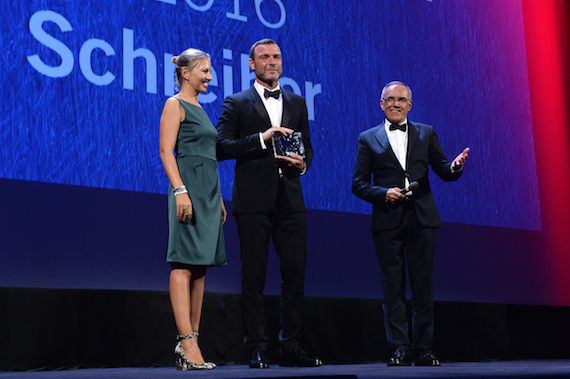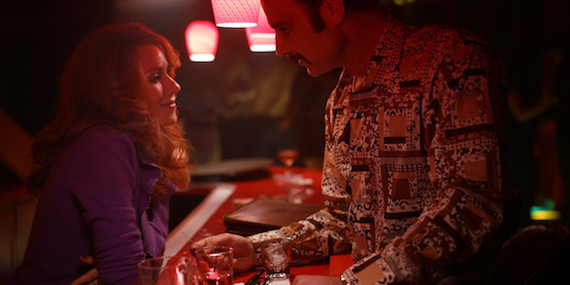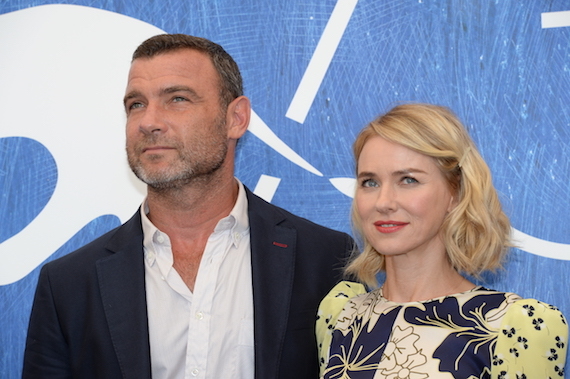Just what makes a movie star? While there are as many different answers as there are stars, journalists and audience members, to me a real rockstar of the big screen is someone with an oversupply of the "C" word: Charisma.
Sitting at a roundtable with six other journalists, and by sheer luck right next to Liev Schreiber at a junket for Philippe Falardeau's The Bleeder, it was clear that Schreiber held us captive with his palpable magnetism. While I hardly could pull my gaze away from his strong face, his engrossing tone of voice and the brightest blue eyes this side of the Grand Canal, if I did manage to glance at my colleagues across the table, men and women alike were mesmerized. And all completely and utterly star struck.
That is a real movie star. But perhaps the true wonder of someone like Schreiber is that he's not just a movie star -- which in itself would be enough -- he's also a filmmaker, a father, a TV star, a loving partner to co-star in life and film Naomi Watts, and a man. What we all felt at that table was the sort of respect that true men command, and it was exhilarating for those twenty-odd minutes.
This year at the Venice Film Festival, Schreiber is promoting The Bleeder, the story of real Rocky inspiration Chuck Wepner, the boxer who went fifteen rounds with Mohammad Ali, only to then loose to the champ. Schreiber also accepted this year's Persol Tribute to Visionary Talent Award, a prestigious prize that has gone to the likes of Frances McDormand and Jonathan Demme in past years. And he's doing all of this, a grueling schedule in Italy before stepping off to Toronto to begin it all again, with class and grace.
When I asked Laura Didoni, the Global Luxury Brands Director for Luxottica Group, why Persol had chosen Schreiber, she explained "Liev Schreiber is a person who is really constantly reinventing himself," then continued "La Biennale and Persol saw in Liev something very close to our brand. He's a very respected Shakespearean actor, so he has a theater heritage, something we have in common really going back to ancient arts. But still he's also made cinema, as an actor and director, very eclectic, and that's why there is a connection, we feel. We have a very unique heritage as well, while also trying to keep an expression that is very fresh. We experiment sometimes, but we never forget where we are coming from. There are a lot of similarities in our stories."
Persol itself has a heritage deeply rooted in Italian cinema and history, from its roots, which Didoni explained by saying that "the brand was founded in 1917 and the first style was created to protect tram drivers in Turin, from the dust and the elements, because trams were open." Then came the iconic Fellini, La Dolce Vita and Marcello Mastroianni's glasses, and of course Steve McQueen, whose love of the brand still holds a special place in cinematic history.
So, considering the definition of elegance that Didoni gave me, "effortless authenticity," then continuing "we [at Persol] think you have something special, everyone has something special, you don't need to follow anyone else or anything else... That's elegance!" I believe wholeheartedly that Schreiber was their perfect choice. And the perfect choice to play Wepner, a man whose courage and virtue, although maybe hiding just beneath the surface, were there all along, plentiful and sincere.
What is it about boxing that every good actor in his career has to make a movie as a boxer?
Liev Schreiber: I don't know what the connection between actors and boxing is, but I suspect it has something to do with fear. But it wasn't the boxing that interested me about this story, it was the kind of rabbit hole of narcissism that the character goes down I found compelling.
Do you think that has a connection with acting?
Schreiber: (laughs) Absolutely!
Do you think Chuck Wepner is Shakespearean?
Schreiber: He's absolutely Shakespearean! But you're talking to a guy who thinks everyone is Shakespearean.
That's why I'm asking! What's Shakespearean about him?
Schreiber: The duality, the conflict, the human tragedy, also his vulnerability, his openness, his innocence, his naiveté, he doesn't hide his mistakes, he makes them beautifully out in the open, exquisitely clumsy. And that's Shakespearean.
What is your experience with fame, and how to handle it?
Schreiber: If we believe the central lie that is at the core of fame, which is that we are the most interesting person in the room, the room quickly becomes empty, and it's a very lonely existence. I think we all struggle with the desire to be appreciated and adored and loved by many. I think actors do it publicly, athletes do it publicly, whereas most of us do it in private and therefore are able to manage it. Whereas when you have real returns from this kind of a feeling, life gets dangerous.
I think having children certainly helped, because you realize you must be able to pay attention to them. I mean to try to teach your kids to look at the world with as much wonder as it looks at you is important and hard and I think Chuck's life is a beautiful analogy of that story and he learned it so well. You see him now with his family and he's a remarkable husband, a great dad and a really, really beautiful guy. But I think it's because he went through that battle. I certainly think his battle with his own demons was much much worse than fifteen rounds with Mohammad Ali.
What did you learn about boxing?
Schreiber: I've been boxing around fifteen years, not seriously, just as a way to keep fit and it's a sport I enjoy. I was a competitive fencer and it felt a lot like fencing initially. I never really boxed with anyone trying to hurt me... I mean I've had my nose broken a couple of times but it's not as bad as people think it is. I think that's the fascination with boxing. It doesn't hurt to get punched in the face as much as you think it does. There are few nerves and it's all psychological. It's the terror of being punched in the face that's so crippling. It's not the pain. I think initially I was so terrified of being punched in the face that my feet were frozen. And it's when you actually get punched in the face that you go, "oh, that's not so bad" and you loosen up and you're able to see it.
The instinct to move towards danger rather than away from it... is very strange. It's something Chuck possesses in great quantity, he always moves forward, moves forward. And this is a man who's been punched by the likes of Sonny Liston, George Foreman and Mohammad Ali. Arguably the most powerful punchers in the history of boxing and he moves forward, forward, forward and that says everything about the man on many levels.
You were talking about redemption before, Chuck's redemption, so how much do you think that redemption has to do with the woman that he ends up with?
Schreiber: So much of it has to do with it. I think his redemption is looking for himself and he finds himself in loving another person. And maybe the answer to the riddle of narcissism, you know, we often find out who we are through giving something, through being generous and taking the attention off of ourselves. And I think the redemptive thing for him was to be loved by a one person rather than millions.
Working with Ms. Watts, what was that like?
Schreiber: (giggles, yes a grown man giggle) We can't do it very often because we have kids together so if one person's working the other takes care of them. But this is not a character that's particularly close to Naomi, as a person she's kind of a demure English girl, so it was really fun to see her walk out of the wardrobe trailer with the red wig and the fake boobs and the leopard print tights... Not many people know how funny she is so I was really enjoying it.
Was she worried that you were getting so much into these fights?
Schreiber: No, she enjoyed it, she loves seeing me get punched in the face.
We were talking before about the danger of fame. When did you have your ten minutes of madness?
Schreiber: I'm having it right now. As we speak. I started in the theater, a microcosm of it, it was very good training for an actor, because it's a microcosm of fame. If you go through that you come out the other side and go, eh uh, I want something with more continuity, what am I doing and what am I doing it for? Am I learning anything, am I giving anything, and that helps because then you get to the film business and it gets crazy! And then you get to TV and it gets even crazier.
Is it crazier on TV?
Schreiber: Suddenly you are in everyone's living room and there is an intimacy that people feel with you that until you experience that, you really don't know what fame is. To have millions and millions of people think they know you, and feel intimate with you, it's a very strange feeling. Talk to you on the street, and call you "Ray". It's very complicated when someone comes up to you and does that, part of you feels genuine gratitude because they spent that much time with you and they consider what you did worthy of their attention, so there is a real feeling of gratitude, and at the same time, a human instinct to share in the intimacy, but you don't have the intimacy because you don't know them. But they, because they've watched the show, have a level of intimacy with you that you're not aware of. And it's a very strange relationship.
Why did you want to become an actor in the first place?
Schreiber: Probably some tragic level of narcissism that I've come to terms with, but certainly in the beginning I really liked having people's attention. I still do. Well, it's a really good feeling. What you do with it is important. Nothing really compares with live theater. You know you repeat a play eight times a week, it will drive you fucking mad. What changes every night, the one thing that makes it survivable is the audience. A new character comes in every night and does the play with you. And you feel their attention, if you're doing your job right, they're connected, they are energized and they're enjoying it. They are following you and they are leading you and they are nudging you, and you feel by their laughter, by their lack of laughter, by their reactions, you feel connected.
And you've got a team, you share something and you're going to hunt together and you're not alone. Probably many actors started someplace feeling very alone, for one reason or another, and want to change that. I think Chuck's an example of that. He's not an actor but somebody who really felt he had to make his impression on the world so much so that he was going to withstand being punched by the greatest fighter of all times for fifteen rounds. And not go down, by sheer will, because he had to let people know that he was one of them. And that's such an alienating tough position and it's a testament to the success of the Rocky franchise, because we all feel that. It's ironic that we all feel alienated but that's what Stallone tapped into.
The Bleeder screens next at the Toronto International Film Festival.
All images courtesy of La Biennale, used with permission.



